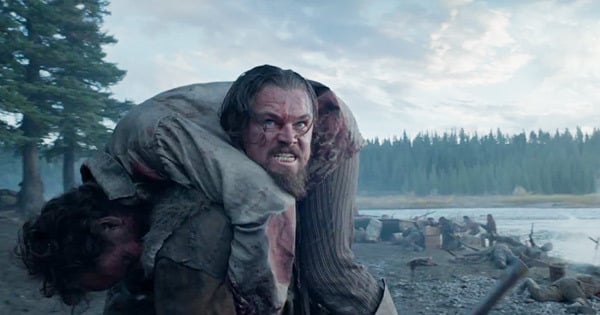Like one of those indoor skydiving places, "The Revenant" offers a visceral recreation of something without much satisfaction. The wind blows against your face and it certainly feels exciting, but there's nothing except a few feet of air below you and a comfortable walk to the parking lot.
That's your expectation checker. Now that it's out of the way, how many people really leave an indoor skydiving place disappointed? Movies are the most transportive artistic medium, and like Werner Herzog taking us down the river in "Aguirre, The Wrath Of God" or Alfonso Cuarón floating alongside Bullock and Clooney in "Gravity," "The Revenant" writer/director Alejandro González Iñárritu and star Leonardo DiCaprio create a stunning transference of feeling. We're there in the muck. Crawling through the snow. Scrounging for food and water.
What's the golden rule of screenwriting - show, don't tell? "The Revenant" is all show and no tell. It's one of those movies like "Apocalypse Now" that's also an incredible chronicle of its own making, and when we return home, safely under our electric blanket and surrounded by four walls, we're not only grateful for what we have now, but feeling like we've experienced something we didn't understand before.
It's 1823, and Amazon Prime is years away. A group of trappers hunt for pelts in the Dakotas, still largely unsettled after the Louisiana Purchase. When Hugh Glass (DiCaprio), a member of the group with unique knowledge of the terrain, ventures alone into the woods and is viciously mauled by a bear, his companions assume him to be at death's door and leave him with John Fitzgerald (Tom Hardy, only slightly more understandable than in "The Dark Knight Rises) as they venture ahead, lest he die alone. Fitzgerald, never trusting or liking Glass in the first place, steals his supplies and abandons him, but not before murdering Glass' son. Despite the extreme wounds and no food or water or weapons, Glass manages to slowly crawl back to civilization, seeking justice.
If "The Revenant" has a major fault, maybe it's Iñárritu's. A man, near dead in the uncharted wilderness, literally crawls home inch by inch, and if he cares about surviving, it's only because he hasn't found his vengeance yet. There's a juicy pulp story buried here, beneath the grit and grime, but Iñárritu seems preoccupied with the grander capital letter themes of Man vs Nature, the Will To Survive, the Birth and Foundation of America. Even that would be tolerable if I felt a steady hand at the wheel. "The Revenant," however, clocks at a needlessly bulky 156 minutes, and there's only so many long takes of DiCaprio crawling through the snow we can take.
Too often throughout "The Revenant" I felt the movie slip away, clearing its throat and announcing its themes without delivering on any of them. It's an exercise in its own creation, and despite the majesty of this exercise, that's ultimately what it remains - emotionally stunted and underdeveloped.
Viewing the movie through this lens, though, maybe the fault is my own, respecting it while not loving it. Too often while watching movies that don't meet our exact hopes, we get too caught up in the hypotheticals. The director shoulda done this, the writer shoulda done that. We confuse choices with faults, and in judging a movie for what it's not, we don't always enjoy it for what it is.
So lets appreciate "The Revenant" for what it is - an arduous, dizzying, and occasionally insane work of cinematography and acting, made by people steadfastly committed to the endgame and willing to see it through. If nothing else, even if Iñárritu directed a script written by and starring Tommy Wiseau, the movie is a visual stunner, capturing vistas rarely matched in the movies.
A more traditional filmmaker might indulge in panoramic wide shots, emphasizing landscapes. Iñárritu instead throws those in sporadically, creating with Emmanuel Lubezki the world we're inhabiting, then opts for mostly extreme close-ups. First the place is established, then we're thrown deep in the thick of it. There's no observation, no ease of distance. Whatever the characters are experiencing, we're there with them, sometimes no more than a few inches away. It's a jarring effect, but that's the difference between understanding a moment and feeling it in our bones.
If nothing else, "The Revenant" is a movie to feel deep in your core, and no small credit must be paid to DiCaprio. Truth be told, it's far from his most interesting work. "The Aviator" and "The Wolf Of Wall Street" both had more compelling, three dimensional characters, drawing on his skills as an actor in a complete way; Tom Hardy plays the juicier role here as Glass' adversary. If those movies were his best performances, though, "The Revenant" is his most performance. This is DiCaprio unhinged, primal and volatile, matted hair and chapped lips, hurling himself into the work with the passion of an artist who wants to take his audience somewhere new.
When he wins his now-inevitable Oscar, it will be for the onscreen experience more than the uniqueness of the performance. But you don't see Eddie Redmayne eating raw buffalo liver.
Ultimately "The Revenant" is a gorgeous, epic shaggy dog story, with not a whole lot to say but a real knack in saying it. It's a ravagement of the senses, a case for the widescreen theatrical experience, while sporting a single-take bear attack that makes you understand why Werner Herzog in "Grizzly Man" warned Timothy Treadwell's mother to never, ever listen to the audio of her son's death.
When a movie imposes a vision this powerful, sometimes you're allowed to not look beyond.

No comments:
Post a Comment